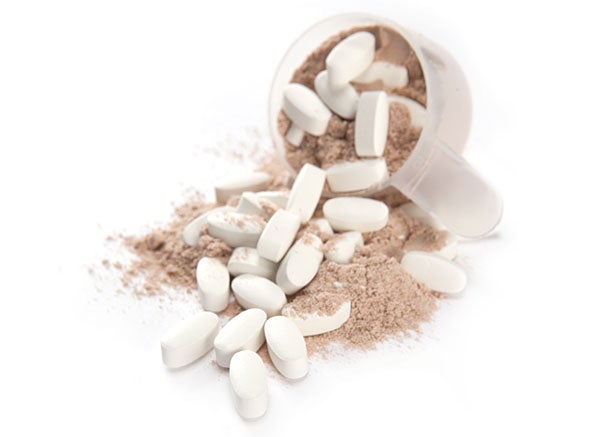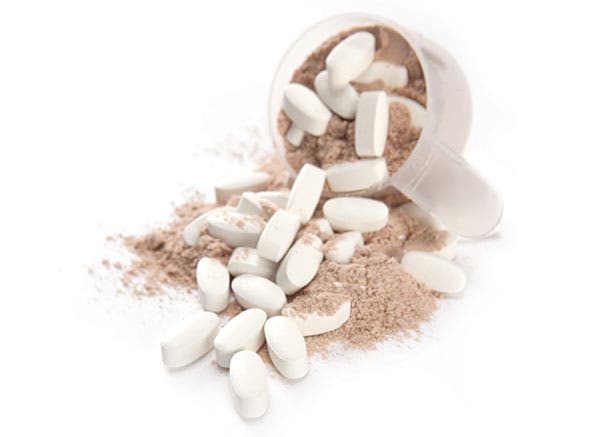Is Tyrosine An All-Purpose Chill Pill?


The purported benefits of tyrosine make it seem like the next great thing. The supplement is said to enhance your fat-burning efforts, your workouts and your sleep. Additionally, it is said to reduce fatigue while at the same time allowing you to use your brain more efficiently. For the active woman, what appears to be most appealing about tyrosine is that it seems to offer a one-stop solution to a universal lament: “I’m too stressed out to workout, to eat and even sleep right.”
But how much do we really know about this amino acid, which can be found as a standalone supplement, as part of a proprietary blend of assorted compounds, as part of many whey protein formulas and as a key component appearing naturally in numerous foods found in your clean eating pantry?
When you ask the opinion of nutrition and supplement professionals like Susan Kleiner, PhD, Oxygen Advisory Board member and Jose Antonio, PhD, CEO of the International Society of Sports Nutrition and a professor at Nova Southeastern University in Fort Lauderdale, Florida, they’ll both agree that the research is equivocal. Simply, more research needs to be done. However, there are some areas of research that show promise.
Improves Brain Function?
You may know that your main chemical messengers — dopamine, norepinephrine and epinephrine (adrenaline) — deliver information from your brain to the rest of your body. What you may not know is that tyrosine helps boost production of this chemical cocktail, which works to help stabilize your body’s reaction to stress factors — the legendary “fight or flight” response — and promotes a sense of well-being.
In 1999, for example, a study published in Brain Research Bulletin reported on soldiers participating in a demanding combat course – meaning, the task was both physically and psychologically difficult. The soldiers who were given a drink containing two grams of tyrosine five times a day performed better on memory and tracking tasks than those who were provided only with carbohydrate drinks. The researchers who conducted this Dutch study concluded that tyrosine could help reduce the effects of stress and fatigue in stressful situations.
According to Antonio, there have also been studies that show 150 milligrams per kilogram of body weight can improve performance under sleep-deprived states. If you’ve been awake for most of the night taking care of your child, for example, taking tyrosine may help you function better, but with the following caveat: Only if your first meal of the day is packed with protein and complex carbohydrates. Tyrosine alone, apparently, isn’t enough to do the magic under such circumstances.
Fat-Loss Aid?
In addition to playing a supporting role in jump-starting your stress-busting threesome of chemicals, tyrosine also helps regulate the famed feel-good neurotransmitter serotonin. Science has already shown that healthy serotonin levels help control not only mood but also food cravings. The brain and how it allows you to manage hunger are inextricably connected, as research supporting the growing mindful-eating trend shows.
Another earlier study determined in part that tyrosine could increase the amount of the chemical messenger norepinephrine in the brain when given to animals that had been placed on a severe calorie-restricted diet. In effect, what norepinephrine does is help increase your heart rate, increase the amount of blood sent to your muscles and enhances the release of glucose from your energy stores.
However, knowing tyrosine’s relationship to assorted feel-good chemicals does not mean that loading up on the amino acid will necessarily lead directly to improved fat loss. Rather, to make that claim, you need to follow inferential logic to get there.
The reasoning goes something like this: A couple of the many metabolic actions that result from the release of norepinephrine, in addition to control of serotonin, include alertness and arousal. Hence, if you’re not thinking clearly and you’re not feeling particularly good about yourself, you may be tempted to give in to your cravings more readily. And if you happen to be on a strict fat-loss plan, tyrosine may help you stay alert and be happy in a bucolic state of clarity.
Even though this chain of reasoning is quite elegant, logical and not without merit, keep in mind that most of such studies have not been conducted on humans to warrant any exaggerated guarantees of fat loss.
Tyrosine as Metabolism Booster?
Your thyroid hormones — the ones that regulate your body’s furnace — are produced by the combination of both tyrosine and iodine. Both substances need to be present if your thyroid gland is to convert them into the primary thyroid hormones that drive your metabolism. So it makes sense that not having enough tyrosine could adversely affect your metabolism, particularly for a woman. In fact, a tyrosine deficiency is often associated with an underactive thyroid, although it is crucial to point out that tyrosine deficiencies are rare in North America. In large part, that may be because a typical Western diet provides ample amounts of tyrosine.
Does Tyrosine Improve Training?
As important as tyrosine is for serving as a precursor of assorted hormones and chemical messengers, here’s a marketing point that may be especially important for the Oxygen reader: Tyrosine can aid your muscle-growth efforts.
Well, for starters, we know that productive training requires focus and intensity. Because tyrosine has been shown to heighten mental alertness and offset mental and physical declines to some degree under certain circumstances, one can speculate with a certain amount of reason that your training will be enhanced.
But is there anything else about tyrosine that may lead to improvements in your training? A Brigham Young University study in the Journal of Applied Physiology may have something to offer. What study authors found was that, “Tyrosine ingestion did not enhance performance during a cycling time trial after 90 minutes of steady-state exercise.” However, they also noted surprisingly that the rate of perceived exertion (RPE) was reduced in the study group that was taking tyrosine.
And what does that mean? It’s possible to speculate that if you don’t feel as fatigued as you might be while working out, you may train a bit longer or harder. And this alone can help with muscle adaptation over time, as long as you don’t overtrain or injure yourself. But again, this may be considered a speculative view.
Who Can Benefit from Tyrosine?
Since this non-essential amino acid plays a significant role in the creation of your “fight or flight” hormones released during periods of stress, tyrosine may just have a place in times of severe stress. Although all agree that more research is needed, tyrosine has been shown to alter mood by improving the way your brain works and, by so doing, may be an effective part of your overall stress-busting regimen.
But it’s equally important to know that tyrosine, on its own, should not be considered a port-of-call for active women looking to boost their performance, burn fat or build muscle. In fact, much of the data on tyrosine supplementation for these purposes it still quite preliminary — there’s very little conclusive evidence that has been replicated by studies.
So why even consider this non-essential amino acid? Because despite our best efforts to stay healthy, stress is an inescapable reality of modern life. And chronic stress can impact all levels of your health, fitness and mental well-being. Research (and common sense, really) shows that when the foundation of a balanced, clean diet made up of whole foods, proper hydration and adequate sleep is not rock solid, your stress hormones can get the better of you and inevitably hinder your fitness goals. As well, stress results in the release of coritsol, which in small doses is protective, but the chronic release of cortisol from relentless day-to-day stress can harm the immune system and lead to fat deposition.
That’s where the synergistic effect of having enough tyrosine in your body may be useful. But before you run out and purchase supplementary tyrosine, just remember though, that this brain-boosting amino acid is found in a variety of food sources and may already be conveniently mixed in your whey protein powder (see “Food Sources of Tyrosine”).
If you feel you must give the supplement a try, consider the following. As for recommended dosages, current Health Canada guidelines – which takes into account, to date, the cumulative body of largely military research that implicates tyrosine supplementation in boosting mental acuity in physically stressful situations (e.g., lack of sleep, exposure to cold) – recommends 10 grams one to two times per day, taken up to one hour before or during periods of hard training under strenuous mental and/or physical conditions. We know, we know, that’s a lot of tyrosine, but remember, the numbers are based on military studies for men under extreme conditions.
For a more realistic dose, the University of Maryland Medical Center suggests that you take 500 to 1,000 milligrams of tyrosine three times per day, approximately 30 minutes before mealtimes. Additionally, the Medical Center also notes that taking vitamins B-6, folate and copper with your tyrosine will aid your body’s ability to convert the amino acid into the crucial brain chemicals.
One final word: This brief review of tyrosine focused on its use as a solitary substance. However, a number of supplements include tyrosine as part of a complex proprietary blend, a mix that includes any number of compounds that often indeed have been shown to enhance training, fat loss and the like. Under such circumstances, because these blends are proprietary, the specific synergistic action of all of these compounds working together as claimed cannot be verified at the time of this report, but that does not mean that they don’t work as advertised. Seek your doctor’s approval before taking any of these or other supplements.
Tyrosine Isn’t For Everyone
The standard rule of thumb about including supplements, including the addition of tyrosine or products that include tyrosine as part of their blend, is to always seek the go-ahead from your family physician, who should know your medical history. This rule is especially important, according to the University of Maryland Medical Center, if you’re taking the following medications:
- MAO Inhibitors: Anyone on antidepressant medications known as MAOIs (Marplan, Nardil, Parante and Selegiline) should avoid tyrosine. In concert with these medications, tyrosine, whether through supplements or foods, can dramatically increase blood pressure and often to dangerous levels.
- Thyroid Hormones: Because tyrosine is one of the precursors to thyroid hormones, it can elevate levels much too high.
- Levodopa: Used to treat Parkinson’s disease, Levodopa, known as L-dopa, may interfere with how your body absorbs tyrosine.
Food Sources of Tyrosine
Whenever possible your best bet is to get nutrients from whole foods, often because of the synergistic effect these micronutrients have with each other. Foods that are high in tyrosine include:
- Avocado (49 mg per ½)
- Banana, medium-size (11 mg)
- Beans, such as lima beans (519 mg per cup)
- Egg whites (151 mg each)
- Low-fat cottage cheese (746 mg per ½ cup)
- Whey protein (27 mg per tbsp, depending on brand)
- Fish (approx. 740 mg per 100 g)
- Chicken breast (1,047 mg per 100 g)
- Turkey (1,188 mg per 100 g)
- Shrimp, 4 large (153 mg)
- Dry-roasted, unsalted nuts (429 mg per ½ cup)
- Oats, cooked in water (320 mg per cup)
- Pumpkin seeds (383 mg per oz)
- Sesame seeds (208 mg per oz)
- Wheat flour (240 mg per ½ cup)
- Mustard greens (80 mg per cup)